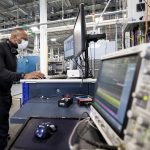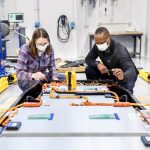
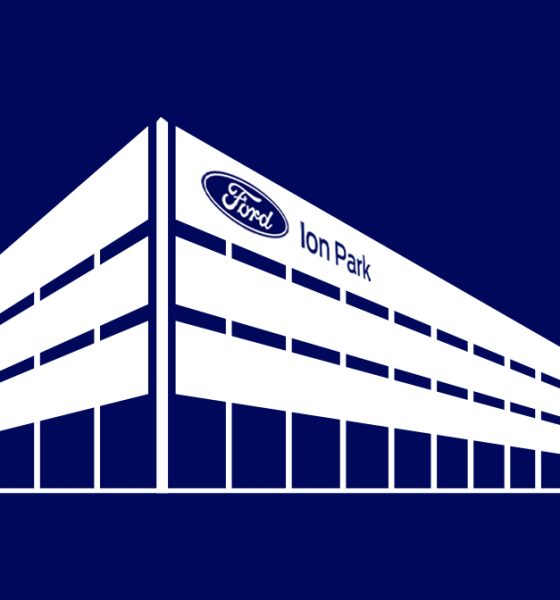
News
Ford announces ‘Ion Park’ for electric vehicle battery production and research
Today, Ford Motor Company announced that it will establish Ford Ion Park, an electric vehicle battery cell production and research and development facility. The Michigan automaker will stay in its home state for this new project, launching the site in Romulus, MI, keeping with its 2010 announcement to make the state Ford’s center of excellence for EVs.
Ion Park will be held at a refurbished 270,000 square foot facility. Housing a maximum of 200 engineers, the facility will include “world-class pilot-scale equipment for electrode, cell, and array design and manufacturing engineering and innovation,” Ford said.
- Dane Hardware, Ford Motor Co. design and release engineer, tests the state of charge (SOC) of the battery chamber and cell temperatures on a running battery at Ford’s Battery Benchmarking and Test Laboratory in Allen Park, Michigan.
- Dane Hardware, Ford Motor Co. design and release engineer, and Mary Fredrick, Ford Motor Co. battery validation engineer, measure the voltage of a battery using a digital multi-meter at Ford’s Battery Benchmarking and Test Laboratory in Allen Park, Michigan. Since this battery is not connected to a test setup, the meter is used to confirm the battery voltage and check isolation.
Following the successful launch of the Mustang Mach-E last year, Ford’s first attempt at electrification has gone much better than its other legacy competitors. The Mach-E maintained the fourth spot in Car and Drivers’ most recent EV rankings, finishing behind the Tesla Model Y and Model 3 and the Chevrolet Bolt EV, respectively.
Ford Mustang Mach-E wins Car and Driver’s 2021 “EV of the Year” award
“Ford already is delivering on our plan to lead the electric revolution with strong new vehicles including Mustang Mach-E, 2022 E-Transit available late 2021 and the 2022 F-150 Lightning available from spring next year,” said Anand Sankaran, who will be the Director of Ion Park. “The new lab will help Ford speed up the battery development process to deliver even more capable, affordable batteries and is part of Ford’s renewed commitment to making Michigan a centerpiece of its focus on EVs.”
Much like industry leader Tesla, Ford is attempting to figure out the challenges behind battery cell constraints while exploring new technologies that could introduce increased range, performance, and lifespan for EV cells. After announcing a $185 million investment into EV battery cell development, including the development of cell arrays, testing, and manufacturing, Ion Park will make up a significant portion of that budget: $100 million of it, to be exact.
The $100 million Ford will spend on Ion Park is just a drop in the bucket for its planned EV expenditure. The company committed $30 billion into electrification by 2025, a relatively short-term plan that differs from the outlines that many other car companies have talked about for the coming years. Perhaps this is Ford’s biggest advantage. It could be why the company is arguably the most serious in terms of legacy car companies that have pledged toward a transition to sustainable powertrains.
Along with the Mach-E, Ford will roll out several new all-electric vehicles in the coming years. Earlier this year, it announced the F-150 Lightning, the all-electric take on America’s best-selling pickup truck. Additionally, Ford will venture into the commercial electric vehicle market with the 2022 E-Transit van, which could benefit from the advancements in cell technology that Ford plans to make at the new Ion Park facility.
Don’t hesitate to contact us with tips! Email us at tips@teslarati.com, or you can email me directly at joey@teslarati.com.

News
Tesla FSD (Supervised) fleet passes 8.4 billion cumulative miles
The figure appears on Tesla’s official safety page, which tracks performance data for FSD (Supervised) and other safety technologies.

Tesla’s Full Self-Driving (Supervised) system has now surpassed 8.4 billion cumulative miles.
The figure appears on Tesla’s official safety page, which tracks performance data for FSD (Supervised) and other safety technologies.
Tesla has long emphasized that large-scale real-world data is central to improving its neural network-based approach to autonomy. Each mile driven with FSD (Supervised) engaged contributes additional edge cases and scenario training for the system.
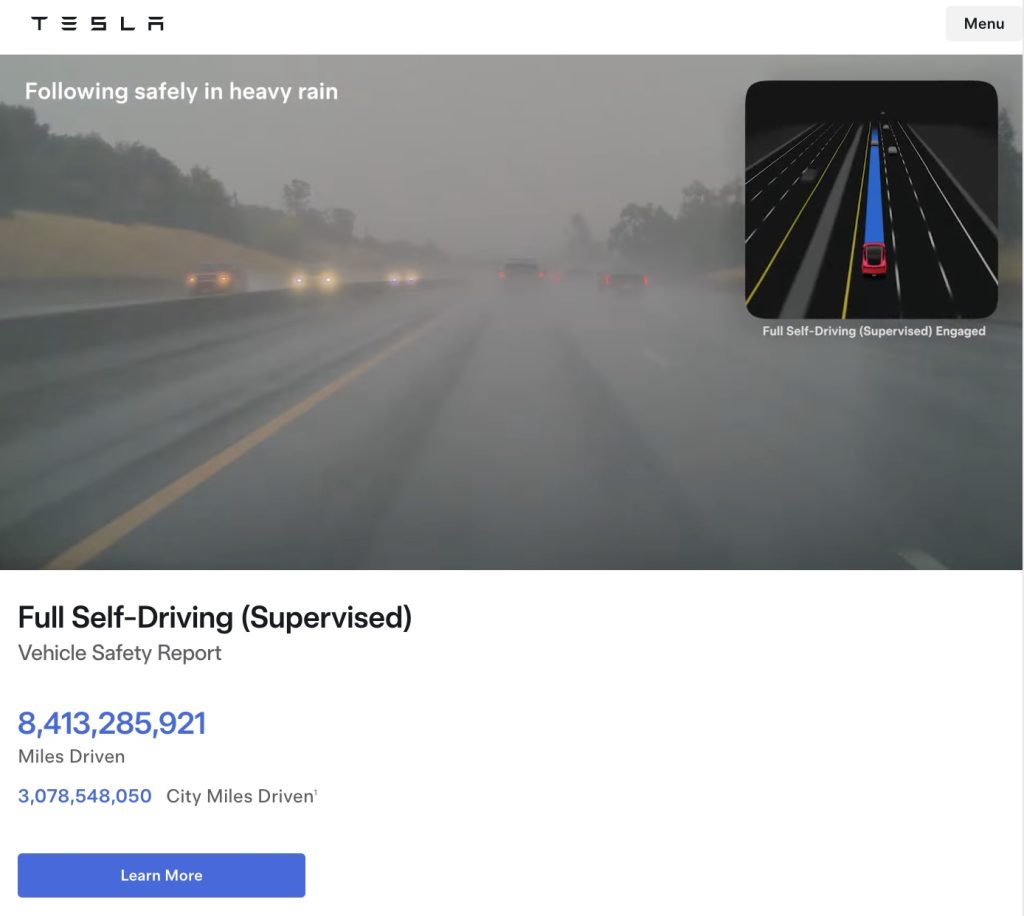
The milestone also brings Tesla closer to a benchmark previously outlined by CEO Elon Musk. Musk has stated that roughly 10 billion miles of training data may be needed to achieve safe unsupervised self-driving at scale, citing the “long tail” of rare but complex driving situations that must be learned through experience.
The growth curve of FSD Supervised’s cumulative miles over the past five years has been notable.
As noted in data shared by Tesla watcher Sawyer Merritt, annual FSD (Supervised) miles have increased from roughly 6 million in 2021 to 80 million in 2022, 670 million in 2023, 2.25 billion in 2024, and 4.25 billion in 2025. In just the first 50 days of 2026, Tesla owners logged another 1 billion miles.
At the current pace, the fleet is trending towards hitting about 10 billion FSD Supervised miles this year. The increase has been driven by Tesla’s growing vehicle fleet, periodic free trials, and expanding Robotaxi operations, among others.
With the fleet now past 8.4 billion cumulative miles, Tesla’s supervised system is approaching that threshold, even as regulatory approval for fully unsupervised deployment remains subject to further validation and oversight.
Elon Musk
Elon Musk fires back after Wikipedia co-founder claims neutrality and dubs Grokipedia “ridiculous”
Musk’s response to Wales’ comments, which were posted on social media platform X, was short and direct: “Famous last words.”
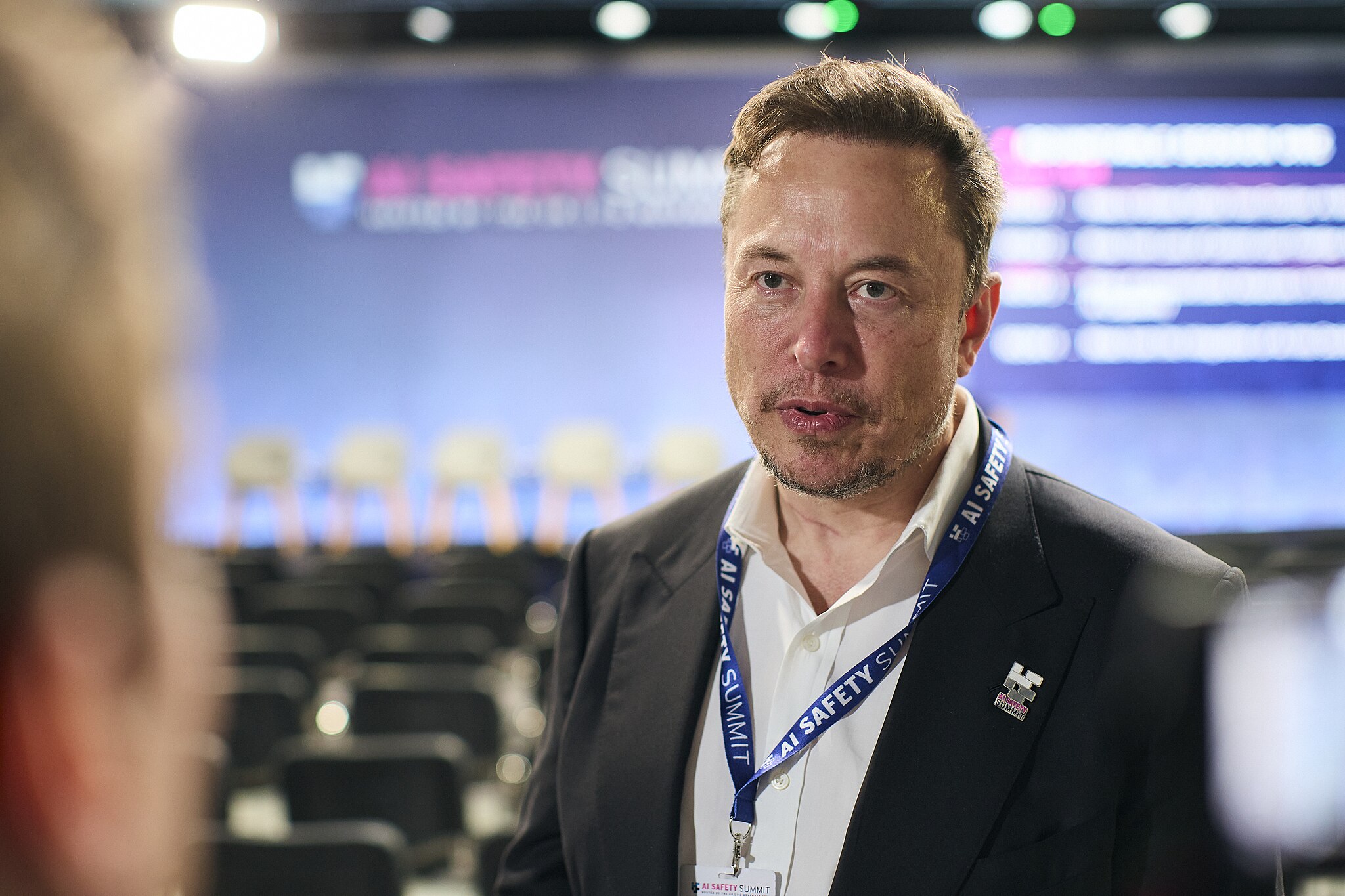
Elon Musk fired back at Wikipedia co-founder Jimmy Wales after the longtime online encyclopedia leader dismissed xAI’s new AI-powered alternative, Grokipedia, as a “ridiculous” idea that is bound to fail.
Musk’s response to Wales’ comments, which were posted on social media platform X, was short and direct: “Famous last words.”
Wales made the comments while answering questions about Wikipedia’s neutrality. According to Wales, Wikipedia prides itself on neutrality.
“One of our core values at Wikipedia is neutrality. A neutral point of view is non-negotiable. It’s in the community, unquestioned… The idea that we’ve become somehow ‘Wokepidea’ is just not true,” Wales said.
When asked about potential competition from Grokipedia, Wales downplayed the situation. “There is no competition. I don’t know if anyone uses Grokipedia. I think it is a ridiculous idea that will never work,” Wales wrote.
After Grokipedia went live, Larry Sanger, also a co-founder of Wikipedia, wrote on X that his initial impression of the AI-powered Wikipedia alternative was “very OK.”
“My initial impression, looking at my own article and poking around here and there, is that Grokipedia is very OK. The jury’s still out as to whether it’s actually better than Wikipedia. But at this point I would have to say ‘maybe!’” Sanger stated.
Musk responded to Sanger’s assessment by saying it was “accurate.” In a separate post, he added that even in its V0.1 form, Grokipedia was already better than Wikipedia.
During a past appearance on the Tucker Carlson Show, Sanger argued that Wikipedia has drifted from its original vision, citing concerns about how its “Reliable sources/Perennial sources” framework categorizes publications by perceived credibility. As per Sanger, Wikipedia’s “Reliable sources/Perennial sources” list leans heavily left, with conservative publications getting effectively blacklisted in favor of their more liberal counterparts.
As of writing, Grokipedia has reportedly surpassed 80% of English Wikipedia’s article count.
News
Tesla Sweden appeals after grid company refuses to restore existing Supercharger due to union strike
The charging site was previously functioning before it was temporarily disconnected in April last year for electrical safety reasons.
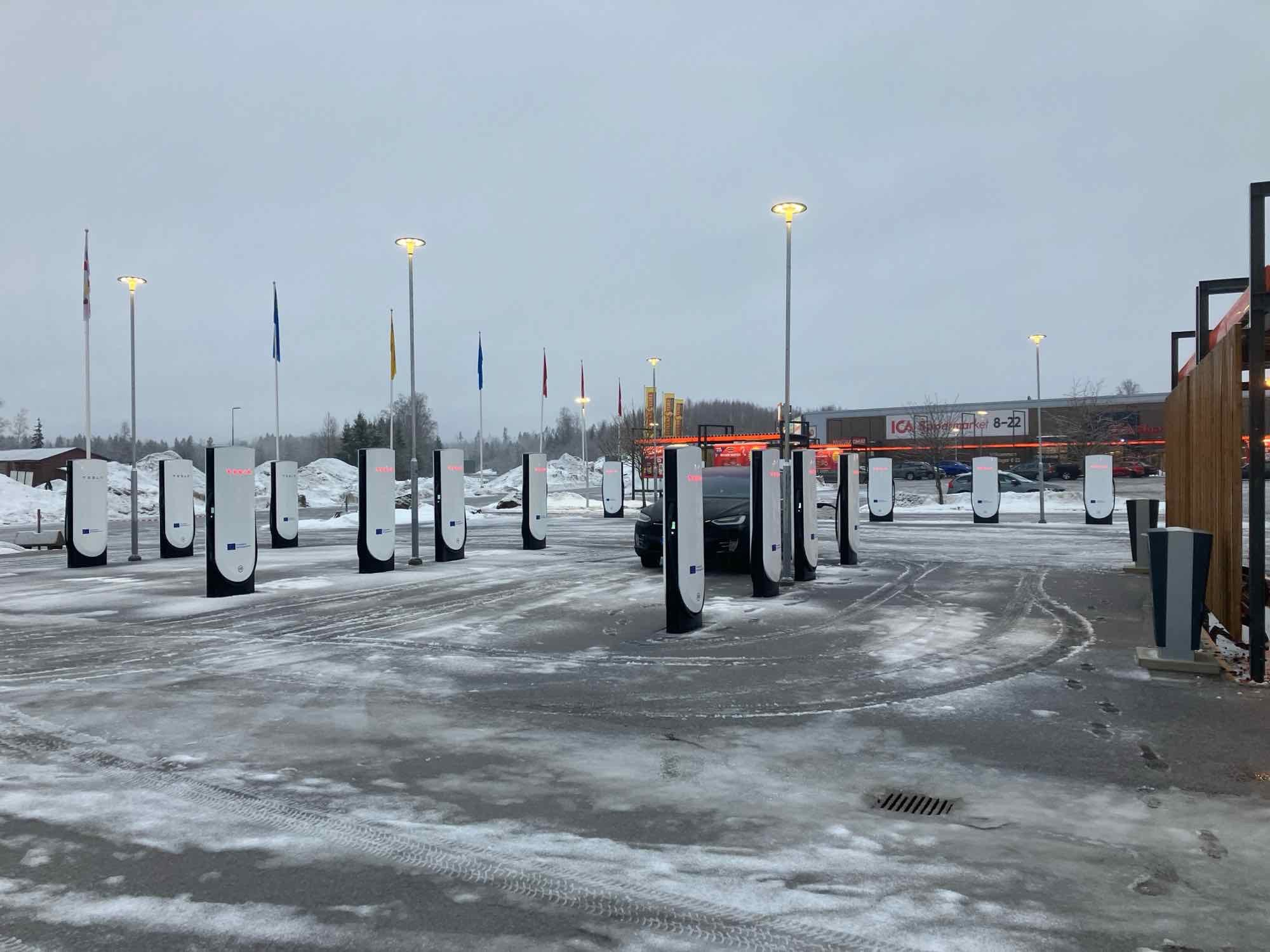
Tesla Sweden is seeking regulatory intervention after a Swedish power grid company refused to reconnect an already operational Supercharger station in Åre due to ongoing union sympathy actions.
The charging site was previously functioning before it was temporarily disconnected in April last year for electrical safety reasons. A temporary construction power cabinet supplying the station had fallen over, described by Tesla as occurring “under unclear circumstances.” The power was then cut at the request of Tesla’s installation contractor to allow safe repair work.
While the safety issue was resolved, the station has not been brought back online. Stefan Sedin, CEO of Jämtkraft elnät, told Dagens Arbete (DA) that power will not be restored to the existing Supercharger station as long as the electric vehicle maker’s union issues are ongoing.
“One of our installers noticed that the construction power had been backed up and was on the ground. We asked Tesla to fix the system, and their installation company in turn asked us to cut the power so that they could do the work safely.
“When everything was restored, the question arose: ‘Wait a minute, can we reconnect the station to the electricity grid? Or what does the notice actually say?’ We consulted with our employer organization, who were clear that as long as sympathy measures are in place, we cannot reconnect this facility,” Sedin said.
The union’s sympathy actions, which began in March 2024, apply to work involving “planning, preparation, new connections, grid expansion, service, maintenance and repairs” of Tesla’s charging infrastructure in Sweden.
Tesla Sweden has argued that reconnecting an existing facility is not equivalent to establishing a new grid connection. In a filing to the Swedish Energy Market Inspectorate, the company stated that reconnecting the installation “is therefore not covered by the sympathy measures and cannot therefore constitute a reason for not reconnecting the facility to the electricity grid.”
Sedin, for his part, noted that Tesla’s issue with the Supercharger is quite unique. And while Jämtkraft elnät itself has no issue with Tesla, its actions are based on the unions’ sympathy measures against the electric vehicle maker.
“This is absolutely the first time that I have been involved in matters relating to union conflicts or sympathy measures. That is why we have relied entirely on the assessment of our employer organization. This is not something that we have made any decisions about ourselves at all.
“It is not that Jämtkraft elnät has a conflict with Tesla, but our actions are based on these sympathy measures. Should it turn out that we have made an incorrect assessment, we will correct ourselves. It is no more difficult than that for us,” the executive said.
